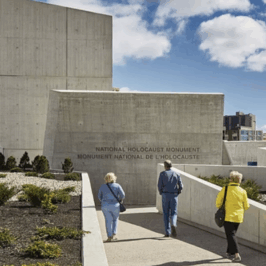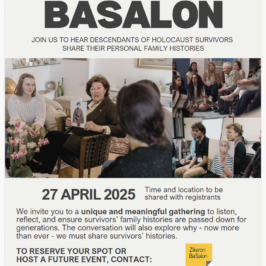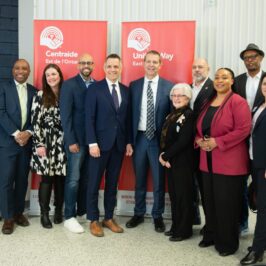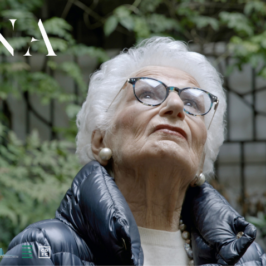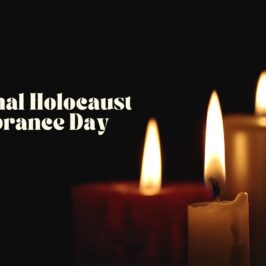A SPECIAL REPORT
On January 27th, 1945, the Auschwitz- Birkenau concentration camp, where more than one million people died in its notorious gas chambers, was liberated. On January 27th, 2023 – International Holocaust Remembrance Day – students at Ottawa’s Sir Robert Borden High School (SRB) commemorated the liberation by viewing two of ten survivors’ testimonials produced by CHES and chosen by the classroom teachers.
The initiative is part of SRB acting principal Christy Armstrong’s fight against antisemitism and support for Holocaust Education. Kenra Mroz worked with Principal Armstrong and facilitated the project, provided guidance to the teachers, and proposed activities for the students ahead of time.
CHES is pleased to share a cross-section of students’ reactions to the testimonials and survivors’ responses.
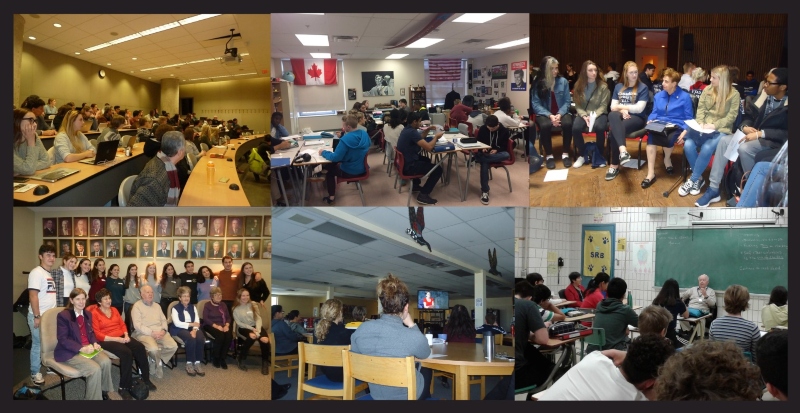
Students Address the Survivors
Adam: I just wanted to let you know that I stand with you. Your experience resonated with me and impacted me in a way I have never felt before. I’m sorry for this to have happened to you and still impacts you today over 70 years later …I hope you are able to live your life with some peace. I hope this world will be more welcoming to everybody and that this will never happen again. I hope your life will be less difficult and that people will support you.
Madhav: Your stories really stick with me; I can’t even imagine having to go through all of that. The pain and suffering you endured is scary and you are so brave.”
Georgi: Please continue to share your stories as it is important for everyone to have knowledge of what it is like to be a holocaust survivor, or survivor of World War 2 in general.”
Sophia: … I’m terribly sorry for what you had to go through, what you had to experience. No one deserves to be treated like anything other than a human being. I really admire your strength and bravery and my condolences for anyone that you lost during these hardships. Thank you for sharing your story. I hope you know that you’re being heard.
Daniel: The years 1933 to 1945 will go down in history as some of the worst times imaginable. Cultural genocide occurred throughout the world and a great number of innocent lives were lost. Families were broken, and lives were changed … THANK YOU! Thank you for your courage in speaking out and thank you for educating on what you endured- no eyes should have to see what you went through. I am truly sorry for all the pain and trauma you endured during those times, and I feel more people should be educated about the Holocaust.
Melania: I come from a Jewish and Christian family that is not typically religious. I work at the Jewish Community Centre as a sports educator, being a head counsellor. Coaching and working with all kids is my passion. My goal in life is to make an impact on others, to be a guide and aid them in any situation, just like you. You made an impact with your story, how you survived and what you witnessed. My questions:
Do you look at life differently since that period?
Did life continue as “normal” after the Holocaust ended?
Did you reconnect with family after the Holocaust ended?
Did you meet anyone while you were there you could call a “friend”?
You survived the unthinkable; do you educate others?
The Holocaust was a horrific and inhumane event. I am horrified by how you were living, with so little food, such little access to personal care items, and being cut off from your community … You unwittingly inspire everyone and let it go unnoticed. I appreciate your bravery and hope you have been finding healthy ways to deal with trauma.
Never Again. Never Forget.
The Survivors Respond
Tova Clark: I was asked if my childhood was changed as a result of moving out of Germany. If I had stayed in Germany and if the Nazis would not have been in control, I probably would have had a very pampered and privileged childhood since I was an only child, and my parents were well established.
Our life in Shanghai was difficult and financial survival was an issue but not our physical survival. We lived in a very poor area of Shanghai, the three of us in one small room but my father managed to make a living.
Judy Young: How we look at life applies to all Holocaust survivors in a way, even babies who were not in the camps and don’t remember life from before. And of course the answer must be that yes, survivors inevitably look at life differently from those who have not had this experience. I question not only the meaning of my survival but have an ongoing “theme” in my head about how life might have been if my family, especially my parents, had stayed alive. And beyond that: I want to know everything about them that I can find out (both before and during the Holocaust), so I keep searching for information about the family members I did not know; and everything about what happened during the Holocaust, to whom, how, and why? And why did so few people help, why did so many people hate and why were so many people indifferent and did not help even if they could have.
Of course, I am also very grateful for those who did help, and to those who have spent their lives after the Holocaust making sure that such a terrible thing could not happen again. And yet, similar awful tragedies keep happening around the world: think of the Rohingya minority being killed, excluded, and squeezed out of Myanmar, and this is only one example among too many. Despite all of the above, I am not a depressed, unhappy, or difficult-to-live with person; to the contrary, I think it’s very important to be active, curious, participate fully in life, teach my children to do the same and, in my own way work, towards valuing others and helping to create a society which respects diversity and fights against racism and discrimination in all its forms, to help make sure that nothing like the Holocaust could happen again.
Life as Normal: Of course, life did not/could not continue as normal. I was left with neighbours and family members as a one-year-old and was eventually adopted by a cousin of my mother’s, who was never willing or able to tell me anything about my family, and in fact all her life denied what had happened to them. Nobody spoke to me about my parents or even the fact that I was adopted. I had no brothers or sisters and once we left Hungary after the 1956 revolution, I had no family other than my adoptive parents and nobody to ask. The Holocaust was never mentioned or talked about at home. It took me a long time to start learning the history of what is perhaps the worst genocide in modern history, and which happened in the centre of “civilized” Europe in the middle of the 20th century, planned and executed by a country with a history of great culture, art, science, and literature.
Reconnecting with Family: I lost too many family members (all those closest to me) and could not connect with any immediate family members. Over the years, and after a lot of searching around, I found some information about my close family members and did connect with a handful of more distant family as well as a few friends of my parents. Even as recently as a few weeks ago, through friends, I found an article just published though written many years ago by a close friend of my father’s in which there was some new information. Therefore, I can never give up looking and searching.
Educating Others: Nothing is more important than educating, especially young people, about the Holocaust and about the terrible evil that hatred of people who are different from us can lead to. It is very important to know the truth about the past, and not to cover it up, or distort it or falsify the facts, and to make sure that we work towards eliminating all forms of racism and discrimination.
Judy Young: We are lucky to live in a country like Canada where this message is encouraged in our school systems, and in our way of life. But even here we must be on our guard. We cannot change the past, but we can and must learn from it to make sure that genocides such as the Holocaust do not happen again. It’s very important to carry this message into our schools: Just because someone has a different skin colour, or religion, or speaks differently from us, we must not exclude them, and we must speak up for the rights of others to be different. For the Holocaust did not begin in the gas chambers: it began with words, words of exclusion and hatred. Gradually, in Nazi Germany and its allies, this became a state-sanctioned ideology of hate which led to the murder of millions of Jews. And, as the well-known Holocaust survivor and writer Eli Wiesel has said: “This murderous policy could not have succeeded as well as it did without the indifference of many people. Indifference in the face of evil always benefits the aggressor and not the victim. So I feel it is my duty to do as much as I can to tell my story – or the stories of others in similar situations and try to make the world around us a better place.
Kati Morrison: I am looking at life as an accidental survivor of genocide. I am appreciating all good things life offers and not taking anything for granted. Also the human potential for evil is very much in my awareness.
Life cannot be ” normal” after surviving the Holocaust; it can only look ” normal”. For years we were not allowed to be Jewish, never learned about Holocaust as part of our history. My mother had tuberculosis and suffered from depression after she survived the concentration camp. Our dread of losing a loved one never stopped. Even now. We had no extended family, but we had a sense of hope that I still cannot understand. And our love for each other maintained our ability to move on . We were fortunate that our nuclear family survived.
Educating others?
Educating interested people, especially students when they are most vulnerable to negative influences, is my hope so that they will not want to be bullies or bystanders when others are hurt due to their origins, gender, or beliefs. There is only one race, and that is the human race.
If sharing my story can enlighten some, I will keep sharing as long as I can.

